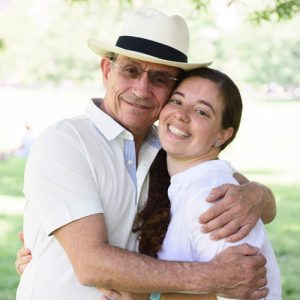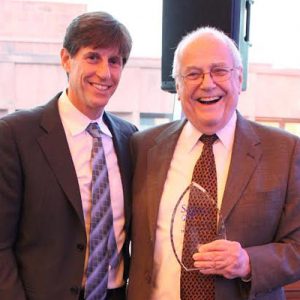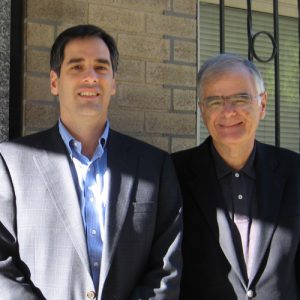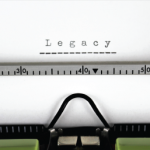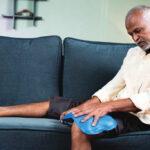 Earlier this year, The Rheumatologist profiled a few families with at least two rheumatologists. Think family practice—rheumatology style. Here are a few more stories of rheumatologists whose children followed in their footsteps.
Earlier this year, The Rheumatologist profiled a few families with at least two rheumatologists. Think family practice—rheumatology style. Here are a few more stories of rheumatologists whose children followed in their footsteps.
Did What I Did, Not What I Said
Gary Sterba, MD, was a rheumatologist in his native Venezuela for 30 years. Based on experience, he knew how hard the job was. His daughter, Yonit, knew it, too, from listening to his stories. They both realized the time away from home the profession calls for when it’s done right. So when she took the national exam to become a healthcare professional, Dr. Sterba pushed her toward bio-analysis or nutrition.
Dr. Sterba says medicine requires a lot of sacrifices, and he “thought she could take it easier. She went for her university exams, and she did very, very well. So she said, ‘You know what? I did very well. I’m not doing nutrition. I’m going to be a physician.’”
Smart choice.
Yonit Sterba Rakovchik, MD, is now a pediatric rheumatologist with Pediatric Specialists of America (PSA), a physician-led multispecialty group practice at Nicklaus Children’s Hospital in Miami, not far from where her father now practices. Dr. Rakovchik’s decision to focus on pediatric patients has differentiated her from her father. It was a conscious effort to forge her own path within the specialty, but she says working with younger patients always appealed to her.
“I always wanted to do my own thing,” Dr. Rakovchik says. “[When I was] in medical school, [my father] knew one of my teachers. I [told Dad], ‘You don’t have to tell them I’m your daughter. I don’t want preferential treatment.’ … I just want to do my own thing.”
This past year, after Dr. Rakovchik completed her residency at Jackson Memorial Hospital in Miami and her fellowship at The Children’s Hospital at Montefiore in the Bronx, N.Y., happenstance brought the father–daughter duo together in Miami. And now, they can each bounce rheumatic disease cases off each other.
Dr. Rakovchik respects how much effort her father put into his work in Venezuela over decades, learning how to deal with pediatric patients who had few physician options. She’s happy to get his perspective.
“I have someone extra to discuss my cases with, especially the challenging ones,” she says. “In pediatric rheumatology, we have a very small community. So … it’s always interesting to get his opinion on patients. I always take it into account.”
“It’s not like she easily accepts what I say,” Dr. Sterba says, proudly adding he respects her confidence and independence. “I say, ‘Why don’t you give [the patient] prednisone?’ and she’ll question it. It’s a challenge.”
Rheumatology and fatherhood can be that way, sometimes.
Like Father, Like Son
“My dad, Harry Spiera, MD, was the quintessential role model of a clinician-educator-scholar,” says Dr. Robert Spiera, MD, director of the Vasculitis and Scleroderma Program at the Hospital for Special Surgery, New York. “I grew up seeing how taken he was with what he did, how good he was at what he did and how much he loved what he did.”
Still, Dr. Robert Spiera didn’t plan to go into rheumatology, the field in which his father spent more than 40 years as chief of rheumatology at Mount Sinai Hospital, New York. First, he looked at otolaryngology and psychiatry, eventually choosing internal medicine and eyeing a possible future in infectious disease. By coincidence, one of Dr. Robert Spiera’s advisers at Cornell University Medical College, New York, was Charles Christian, MD, the dean of the specialty who happened to have mentored Dr. Harry Spiera at one time.
When Dr. Robert Spiera became a rheumatologist, his father felt nothing but pride. “It’s great,” says Dr. Harry Spiera, who retired in October 2017, just a few months before his 87th birthday. He saw it as “an affirmation that I projected something that seemed to be worthwhile.”
He says talking over cases with his son is “like another dimension. We’ve bonded over it. … It is just wonderful being on the same wavelength.”
For Dr. Robert Spiera, a principal investigator for several clinical trials who has authored more than 100 articles, the lessons learned from his father could not be found in textbooks or on rounds. Instead, he learned about the days of treating patients with barely more than aspirin, steroids and gold.
“There’s a lot of evidence-based practice in rheumatology, as there is in other specialties,” Dr. Robert Spiera says. “But there is also a lot of art to rheumatology. And my dad had such a huge clinical experience, seeing patients and not only really taking care of them, but really intimately, deeply caring about them. … He is a great sounding board.”
Dr. Robert Spiera now has two children of his own who are entering medical school, one this fall and one in 2019. Like his father, Dr. Robert Spiera won’t pressure them about what specialty to choose.
“I’m thrilled they’ve chosen medicine as a career,” Dr. Robert Spiera says, sounding like his father. “Very few people are privileged like we are to be involved so meaningfully in such an important part of people’s lives.”
Family Practice, International Style
When your dad is Hasan Yazici, MD, a Turkish-born rheumatologist who did some of his training at Creighton University, Omaha, and later became one of the world’s leading experts on Behҫet’s syndrome, it’s unlikely your résumé will be the same. But don’t say that to Yusuf Yazici, MD, who is also a rheumatologist and like his father, Dr. Hasan Yazici, did his residency at Creighton. He is now director of the Seligman Center for Advanced Therapeutics and Behҫet’s Syndrome Center at New York University Hospital for Joint Diseases.
“Of course, having a rheumatologist in the house has an influence on what you do,” says Dr. Yusuf Yazici, who was born in Philadelphia, but grew up and went to school in Turkey. “The main point is that it allows [you to do] many different things. … In the U.S., if you’re in private practice, you can do some research, some teaching. You can do clinical trials and be involved in many different areas. Rheumatology is one of the few specialties that allows you to do many different things, which keeps your daily work interesting. And I saw my father do similar things. He didn’t see patients all the time. He saw patients; he did research; he taught.”
By the time Dr. Yusuf Yazici was doing his fellowship at the Hospital for Special Surgery in New York in the late 1990s, Behҫet’s patients were reaching out to him.
“I started getting calls from patients who said they were diagnosed with Behҫet’s, and they would say there was a Dr. Yazici who worked on Behҫet’s. And was I the same person?” Dr. Yusuf Yazici recalls. “I said, I was his son, and they said, ‘Close enough, we’ll come see you.’”
The Turkish father and son became a global pipeline for patients of a disease named for a Turkish dermatologist. Dr. Hasan Yazici was the chair of the Division of Rheumatology at the University of Istanbul from 1978–2012. Every Monday, he still goes to the campus to meet with the fellows he’s trained and talk with patients.
In 2010, the duo co-authored a textbook, Behҫet’s Syndrome. In 2014, they co-wrote, with a third author, a book named Understanding Evidence-Based Rheumatology.
An added bonus of this cross-continental collaboration is that they are able to cross paths at medical conferences, meetings and other work-related events. Otherwise, they are a family separated by 5,000 miles.
“We always take a family vacation once a year, and they always come here once a year,” Dr. Yusuf Yazici says. “But I’m in Turkey four or five times a year. Most of this [traveling] is initiated by work-related events, but you build family time around that, too. At one point, my mother was saying she sees us more than one of my younger brothers, who lives in Istanbul.”
Richard Quinn is a freelance writer in New Jersey.
